Posted December 3, 2023 by Nicky in Reviews / 4 Comments

Castles of the Welsh Princes
Genres: History,
Non-fiction Pages: 108
Rating: 
Synopsis: The Medieval castles built and occupied by the native princes of Wales hold a special place in the imagination of the Welsh and have an unique historical appeal. The 500 and more castles of Wales testify to the remorseless military ambitions of the Normans and the English but also to the tenacious resistance of the Welsh and their unswerving belief in Welsh independence. In this fully illustrated book, Paul Davis guides the reader to some of the most awe-inspiring and romantic castles in Wales and describes their construction and history.
Paul R. Davies’ book leads with a little potted history of the Welsh princes, to contextualise the castles described and pictured. It’s not all full-colour — sometimes castles are illustrated by sketches and plans, or not pictured at all where we know very little — but the plans provided give a nice visual guide to some of the structures and layouts mentioned. Each entry includes a little section explaining how to visit the castle (if at all possible).
The thing I found most interesting was actually the discussion of why certain castles are built the way they are — for instance, with towers that are unusually placed compared to Norman-build castles of the period. The theory is basically that the builders had no idea why you wanted towers, or how to best make use of them at least, so they didn’t always position them “correctly” (leading to stuff like blind spots that are perfect for an attacking enemy).
It’s a short volume, but worth the read if you’re interested in Welsh castles. It confines itself to castles built and occupied by the Welsh princes, rather than Norman castles, though sometimes it will mention sites where both sides had a period of occupation enough to make changes to the fabric of the site.
Rating: 4/5
Tags: book reviews, books, history, non-fiction, Paul R. Davis
Posted December 2, 2023 by Nicky in Reviews / 2 Comments

The Black Spectacles
Genres: Crime,
Mystery Pages: 222
Series: British Library Crime Classics Rating: 
Synopsis: A sinister case of deadly poisoned chocolates from Sodbury Cross’s high street shop haunts the group of friends and relatives assembled at Bellegarde, among the orchards of ‘peach-fancier’ Marcus Chesney. To prove a point about how the sweets could have been poisoned under the nose of the shopkeeper, Chesney stages an elaborate memory game to test whether any of his guests can see beyond their ‘black spectacles’; that is, to see the truth without any assumptions as witnesses.
During the test – which is also being filmed – Chesney is murdered by his supposed accomplice. The keen wits of Dr. Gideon Fell are called for to crack this brazen and bizarre murder committed in full view of an audience.
It’s still funny how I thought I really disliked John Dickson Carr’s writing, and now here I am inhaling his books in a day. The Black Spectacles has quite a bit going on, with the police detective getting deeply emotionally involved with the whole thing and Gideon Fell coming in all sympathy and understanding. He’s rather human for one of the Great Detective types, albeit you never learn much about his personal life or opinions outside of crime.
The crime isn’t the locked-room mystery that Carr specialised in, but it is an “impossible crime” — though I realised quickly what was up with that (a similar device used in a couple of other crime novels that I happen to like). It’s fun to work out what’s going on and why.
There is something rather dark about the motivations and the way a particular character is treated, that left me wanting a little more at the end of the novel — something to set the world properly to rights for her. Maybe an epilogue or something. But the mystery is resolved well.
Rating: 4/5
Tags: book reviews, books, British Library Crime Classics, crime, John Dickson Carr, mystery
Posted December 1, 2023 by Nicky in Reviews / 0 Comments
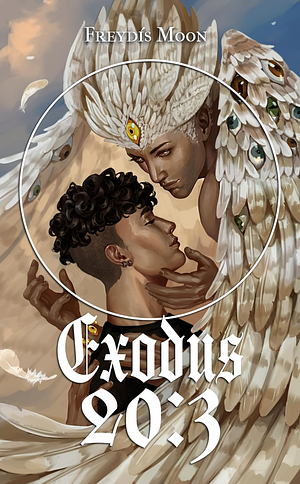
Exodus 20:3
Genres: Fantasy,
Romance Pages: 92
Rating: 
Synopsis: Religious eroticism and queer emancipation meet in a claustrophobic monster-romance about divinity, sexuality, and freedom.
When Diego López is guilted by his mother into taking a low-key construction job in New Mexico, he doesn’t expect to be the only helping hand at Catedral de Nuestra Señora de Guadalupe. But the church is abandoned, decrepit, and off the beaten path, and the only other person for miles is its handsome caretaker, Ariel Azevedo.
Together, Diego and Ariel refurbish the old church, sharing stories of their heritage, experiences, and desires. But as the long days turn into longer nights, Diego begins to see past Ariel’s human mirage and finds himself falling into lust—and maybe something else—with one of God’s first creations.
Like the other book by Freydís Moon that I’ve read, this features a trans masc protagonist, who is infinitely more messed up and unsupported, and stumbles into a strange situation he doesn’t fully understand in order to try and pay back his debts to his family after some big mess-ups. Diego’s supposed to be restoring a church, but he quickly suspects there’s something very unusual about Ariel and he’s both drawn to him and scared of him — and scared of what he may offer.
Spoilers ahead, now: I suspect that there are readers who would be completely repelled by the spirituality of this book, since it features an angel who is determined to show Diego God’s love through sex and physicality. And seems to succeed, to a large degree.
Sex is a big focus of the story here, and Diego’s more personal level of connection to Ariel isn’t really explored as much — only his lunge at the forgiveness offered, at the grace he can be shown. As a novella, it doesn’t have room to do a lot, and the intensity of those scenes is definitely well done — I’d just hoped for a bit more understanding of Ariel, as well.
Rating: 3/5
Tags: book reviews, books, Freydís Moon, romance, SF/F
Posted November 30, 2023 by Nicky in Reviews / 0 Comments
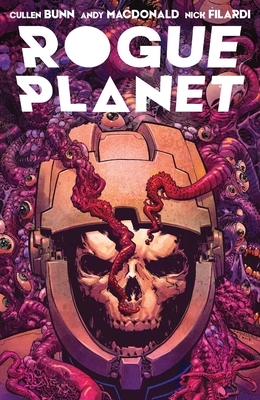
Rogue Planet
Genres: Graphic Novels,
Horror,
Science Fiction Pages: 133
Rating: 
Synopsis: Salvage vessel Cortes tracks the Lonely Orphan, a planet with no star system to call its own. Somewhere on this hostile rock is a payload fit for a king. To attain it, though, the crew of the Cortes must brave razor rock, poisonous vapors, treacherous footing, and... the most mind-numbing horrors imaginable. Struggling to stay alive, they are beset at every turn by horrors from their own nightmares. Now, they have discovered that they are not alone on the planet, and the other inhabitants welcome them... as sacrifices to an elder god.
Stranded on a vicious, murderous, seemingly intelligent planet, the crew of the Cortes must reevaluate what it truly means to survive, and what they are willing to do in order to spare their own lives.
Cullen Bunn’s Rogue Planet is a fairly predictable sci-fi/horror story: a group visit a planet where they should, in theory, be able to get rich quick, led in by a beacon… and of course things go messily wrong, with gore and horrors a-plenty.
I didn’t think it stood out among that sort of genre, with the characters having little to make them jump out; the art was okay, but didn’t particularly impress me with “hey, that looks really neat” or “that’s gorgeous” or even “that’s a whole new way to make something look gross”.
It wasn’t bad in any way, I don’t think, just… fairly run of the mill if you’re an SF/F reader. I’d been hoping for something a bit more innovative, I suppose! I think it could be fun if you’re less versed on the tropes of the genre, since it’ll come as a bit more of a surprise.
Rating: 2/5
Tags: Andy Macdonald, book reviews, books, comics, Cullen Bunn, horror, Nick Filardi, SF/F
Posted November 29, 2023 by Nicky in Reviews / 2 Comments

Around the World in 80 Trees
Genres: History,
Non-fiction,
Science Pages: 240
Rating: 
Synopsis: In Around the World in 80 Trees, Jonathan Drori uses plant science to illuminate how trees play a role in every part of human life, from the romantic to the regrettable. From the trees of Britain, to India's sacred banyan tree, they offer us sanctuary and inspiration - not to mention the raw materials for everything from aspirin to maple syrup.
Stops on the trip include the lime trees of Berlin's Unter den Linden boulevard, which intoxicate amorous Germans and hungry bees alike, the swankiest streets in nineteenth-century London, which were paved with Australian eucalyptus wood, and the redwood forests of California, where the secret to the trees' soaring heights can be found in the properties of the tiniest drops of water.
Each of these strange and true tales -- populated by self-mummifying monks, tree-climbing goats and ever-so-slightly radioactive nuts -- is illustrated by Lucille Clerc, taking the reader on a journey that is as informative as it is beautiful. The book combines history, science and a wealth of quirky detail - there should be surprises for everyone.
Like Around the World in 80 Plants, this is beautifully illustrated by Lucille Clerc, in much the same style: sometimes the images show details of the trees, sometimes a more zoomed out look, and sometimes the pictures include images that illustrate the text directly to show how the trees are used or handled.
If anything, the text seemed livelier in this book than in the other — like, perhaps, the author is just a bit more enthusiastic about trees than general plants. I certainly flew through the book, and found a couple of new-to-me facts that I was eager to tell other people. (Like the stuff about avocado trees!)
If there’s a plant-lover in your life, it’d make a wonderful gift, and there’s also plenty of titbits to pique the interest of anyone who likes this sort of history-through-a-specific-type-of-object (like myself), or just enjoys learning about all kinds of things (also me).
Rating: 5/5
Tags: book reviews, books, history, Jonathan Drori, Lucille Clerc, non-fiction, science
Posted November 28, 2023 by Nicky in Reviews / 0 Comments
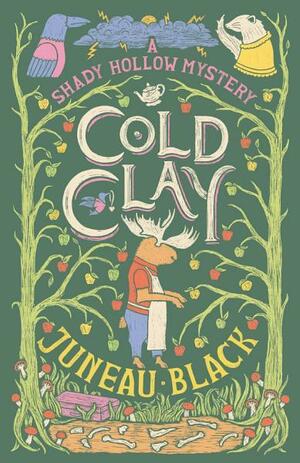
Cold Clay
Genres: Crime,
Fantasy,
Mystery Pages: 208
Series: Shady Hollow #2 Rating: 
Synopsis: It's autumn in Shady Hollow, and residents are looking forward to harvest feasts. But then a rabbit discovers a grisly crop: the bones of a moose.
Soon, the owner of Joe's Mug is dragged out of the coffeeshop and questioned by the police about the night his wife walked out of his life—and Shady Hollow—forever. It seems like an open-and-shut case, but dogged reporter Vera Vixen doesn't believe gentle Joe is a killer. She'll do anything to prove his innocence ... even if it means digging into secrets her neighbors would rather leave buried.
Juneau Black’s Cold Clay is another reasonably cosy mystery in the same vein as the first book: if you didn’t enjoy that, then you won’t find yourself charmed by this one, and if you did enjoy the first one, it’s likely your thing unless the conceit is wearing thin for you already. For me, it wasn’t: I was ready to suspend my disbelief once more, readily engage with the world in which a raven runs a bookshop and a moose a café, and get mildly outraged that the police bear would arrest a hard-working honest moose.
If that all sounds ridiculous, it may not be for you, but the book treats it as obvious (aside from a brief introductory page in which it advises not to get caught up on the how of it all), and it doesn’t get played as ridiculous. Really it’s just about people, except they happen to have some animal traits. Here and there I was annoyed that they didn’t use their animal traits a bit more (flying’s all very well, but some of you have noses, why did nobody ever hunt down a quarry by scent?), but mostly I just suspended my disbelief and settled in to enjoy.
I say it’s a “reasonably” cosy mystery because… I’m never entirely sure where the boundaries are on this one. Murder seems, by definition, pretty uncosy — but a lot of mystery fiction is really about that closure at the end, and saying “everything is going to be okay now”, which is profoundly cosy. Your mileage may vary, but I think this one qualifies.
As far as the actual plot goes, once again I was a bit ahead of the game and identified the culprit quickly, but watching Vera get there was entertaining as far as it goes. I could’ve done without the relationship drama between Orville and Vera — really, kids, just communicate! But all in all, I enjoyed myself once more, and quickly grabbed the next book in the series, the short stories, and the fourth book as well for good measure. I’m having fun.
Rating: 4/5
Tags: book reviews, books, crime, Juneau Black, mystery, SF/F
Posted November 27, 2023 by Nicky in Reviews / 0 Comments

Settling Scores: Sporting Mysteries
Genres: Crime,
Mystery,
Short Stories Series: British Library Crime Classics Rating: 
Synopsis: Talented sportsmen inexplicably go absent without leave, crafty gamblers conspire in the hope of making a killing, and personal rivalries and jealousies come to a head on fields of play The classic stories in this new British Library anthology show that crime is a game for all seasons.
I thought I’d read these sporting mysteries (in this collection curated by Martin Edwards) in honour of the Rugby World Cup, the only sport I have so far managed to care about or even half-understand. The majority of these stories need no sporting knowledge at all to understand and follow; the sporting environment is just the backdrop. Even where you do need to know something, it’s fairly minimal.
It’s not a bad spread of stories, though the tone varies a bit (some stories feel rather brutal, and one involves spies and espionage, etc). Not one of my favourite collections, perhaps, but the sporting types might appreciate it a bit more. I did appreciate that it wasn’t just football and cricket stories or something — there was an archery story included, for example.
As ever, the collection is greater than the sum of its parts: it’s nice to read across a spread of the classic crime/mystery writers, and not just the biggest names, though there is (inevitably) a story by Arthur Conan Doyle.
Rating: 3/5
Tags: book reviews, books, British Library Crime Classics, Martin Edwards, short stories
Posted November 25, 2023 by Nicky in Reviews / 0 Comments
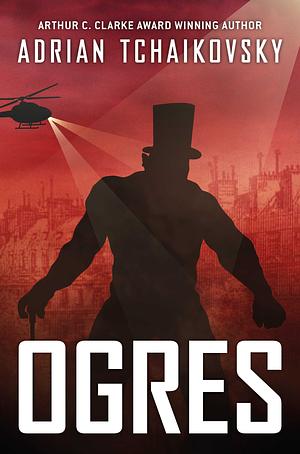
Ogres
Genres: Science Fiction Pages: 102
Rating: 
Synopsis: Ogres are bigger than you. Ogres are stronger than you. Ogres rule the world.
It’s always idyllic in the village until the landlord comes to call.
Because the landlord is an Ogre. And Ogres rule the world, with their size and strength and appetites. It’s always been that way. It’s the natural order of the world. And they only eat people sometimes.
But when the headman’s son, Torquell, dares lift his hand against the landlord’s son, he sets himself on a path to learn the terrible truth about the Ogres, and about the dark sciences that ensured their rule.
I found Adrian Tchaikovsky’s Ogres took me a surprising amount of time to read, despite the length of the book. It’s a pretty unpleasant place to be, in a very believably human way — one which I don’t always care to spend my leisure time dwelling on.
I did enjoy the sting in the tail of the story. I hadn’t worked out who the narrator was (if indeed it was anyone important), so that was interesting. I like second-person POV when it’s done well, though I know others hate it, and I think it was… okay, here. Sometimes it didn’t feel right, when it dug too much into the interior life of Torquell, but mostly I thought it worked. If it’s a pet peeve of yours, though, this won’t be for you.
It all feels a little simplified and fable-like — a political fable, told with serious bias (and intentionally so; I don’t mean that I’m accusing Tchaikovsky of anything here, I’m talking about it as an in-world object).
Altogether, enjoyably put together, but not something I entirely enjoyed the experience of reading.
Rating: 3/5
Tags: Adrian Tchaikovsky, book reviews, books, SF/F
Posted November 24, 2023 by Nicky in Reviews / 0 Comments

Around the World in 80 Plants
Genres: History,
Non-fiction,
Science Pages: 216
Rating: 
Synopsis: Jonathan Drori takes a trip across the globe, bringing to life the science of plants by revealing how their worlds are intricately entwined with our own history, culture and folklore. From the seemingly familiar tomato and dandelion to the eerie mandrake and Spanish "moss" of Louisiana, each of these stories is full of surprises. Some have a troubling past, while others have ignited human creativity or enabled whole civilizations to flourish. With a colorful cast of characters all brought to life by illustrator Lucille Clerc, this is a botanical journey of beauty and brilliance.
The first thing to know is that this book is beautifully illustrated by Lucille Clerc, full colour, at least one full-page image per plant. Sometimes these images show details of the plants, and sometimes they include aspects of the accompanying text explanation.
Jonathan Drori’s discussion of each plant is often brief, and the order is not necessarily in order of the origin of a given plant, but rather a place where they might be encountered now, along with the story of how they got there. The stories vary by plant, often including the human history of how we’ve used the plant, and what the plant has done for us.
I found it fascinating, and I’m definitely passing this on to the plant lover in my life; I think he’ll enjoy it even more.
Rating: 5/5
Tags: book reviews, books, history, Jonathan Drori, Lucille Clerc, non-fiction, science
Posted November 23, 2023 by Nicky in Reviews / 2 Comments
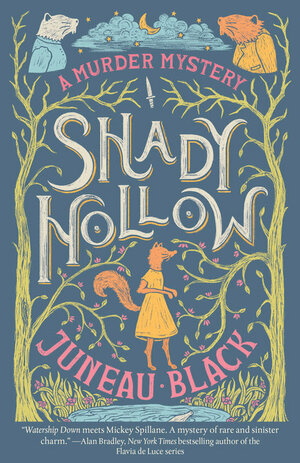
Shady Hollow
Genres: Crime,
Fantasy,
Mystery Pages: 208
Series: Shady Hollow #1 Rating: 
Synopsis: The first book in the Shady Hollow series, in which we are introduced to the village of Shady Hollow, a place where woodland creatures live together in harmony — until a curmudgeonly toad turns up dead and the local reporter has to solve the case.
Reporter Vera Vixen is a relative newcomer to Shady Hollow. The fox has a nose for news, so when she catches wind that the death might be a murder, she resolves to get to the bottom of the case, no matter where it leads. As she stirs up still waters, the fox exposes more than one mystery, and discovers that additional lives are in jeopardy.
Vera finds more to this town than she ever suspected. It seems someone in the Hollow will do anything to keep her from solving the murder, and soon it will take all of Vera’s cunning and quickness to crack the case.
Juneau Black’s Shady Hollow fell into my hands right when I needed something to restore my faith that I actually enjoy reading and don’t just do it because I always have. In theory I was still fascinated by books, but in practice everything seemed a bit tedious — and then I came across Shady Hollow from someone’s Top Ten Tuesday blog post, and decided… I’ll just give it a chance.
In the end, it’s basically a mystery story like so many others… except that the characters are all animals. Our heroine is a fox, the police detective is a bear, the medical examiner is a snake, and the guy who sells everyone coffee is a moose. If you stop too long to wonder about it, you’ll get jolted out of the story — how does a raven turn the pages of a book, or a moose serve coffee? But you can just settle in and enjoy what there is, and the way the animals’ abilities occasionally give things a bit of flavour (like Lenore’s ability to fly), and the way the various different animals interact.
(And of course, of course, a beaver runs the sawmill. Of course.)
In the end, the mystery didn’t surprise me much, and I was a bit disappointed that while abilities like flight are used, it doesn’t mention scent at all. Vera’s a fox! There’s surely some degree of ability to track there — and Orville too!
But mostly I just had fun, and breezed straight through the book, and felt immensely grateful it fell into my paws — sorry, hands — right now.
Rating: 4/5
Tags: book reviews, books, crime, Juneau Black, mystery, SF/F














